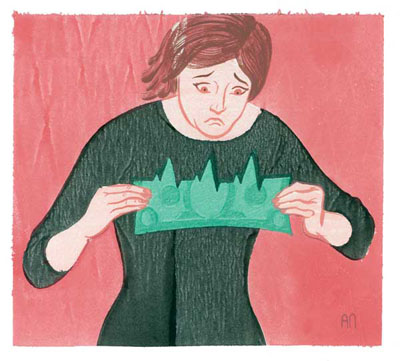
By Sue De Pasquale
Illustration by Alex Nabaum
While it’s long been known that low-income patients have an increased risk of developing cardiovascular disease compared to their high-income counterparts, “the relationship between perceived income inadequacy and cardiovascular disease is not well understood,” notes faculty member Sarah L. Szanton, PhD, CRNP.
She and her colleagues examined the experiences of 522 older women over the course of three years. All of the women were free of car-dio-vascular disease (CVD) at the start and all were participating in two prospective cohort studies aimed at determining the causes and course of disability in older women living in the community. Just less than a quarter of the participants (22%) were African American; the remainder were white.
All the women were asked to report their income as being “enough,” “just enough,” or “not enough” at the end of each month. Nearly one-third (30%) reported not having enough or having just enough money at the end of the month to cover their expenses. The researchers also examined the actual annual income (on average, $22,400) and level of education of the women.
During the three-year study, there were 137 new cases of cardiovascular disease. Szanton and her colleagues found that, independent of actual income, education, race, and age, the women who perceived their income as inadequate (“not enough” or “just enough”) were more likely to develop CVD.
“Based on what we know of the stress response and how it can affect the heart, it is possible that the worry over finances itself has contributed to the onset of cardiovascular disease,” says Szanton, who reported the results at the Sigma Theta Tau 39th Biennial Convention in November. She adds, “Our findings suggest that older women’s perception of their financial resources may be an important risk factor for developing CVD.”